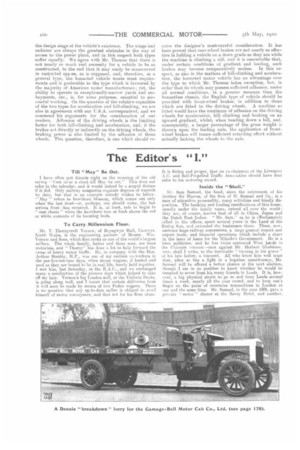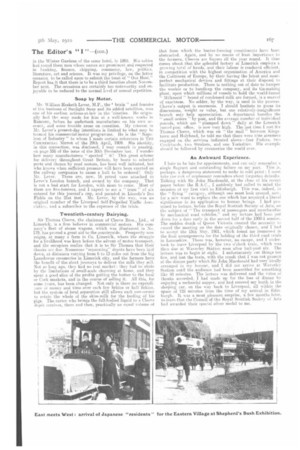The Editor' s "I."
Page 2

Page 3

If you've noticed an error in this article please click here to report it so we can fix it.
Till "May" Be Out.
L have often put friends right on the meaning of the old saying " Cast, ne'er a clout till May be out." This does not refer to the calendar, and it would indeed be a stupid dictum if it did. Only railway companies regulate degrees of warmth by date, but that is art example nobody wishes to follow. " May " refers to hawthorn blossom, which comes out only when the last frost—or, perhaps, one should write, the last serious frost—has occurred. It is, at least, safe to begin to " cast clouts " when the hawthorn tree or bush shows the red or white contents of its bursting buds.
To Carry Millennium Flour.
Mr. T. Thornycroft Vernon, of Bryngwyn Hall, Caerwye, North Wales, is the engineering partner of Messrs. Wm. Vernon and Sens, which firm ranks as one of the world's largest millers. The whole family, father and three sons, are keen motorists, and "Thorny" has done a lot to help forward the cause of heavy motor traffic. He, in company with the Hon. Arthur Stanley, M.P., was one of my earliest co-workers in the pre-five-ton-tare days, when steam wagons, if loaded and used as they are bound to be in real life, barely held together. met him, last Saturday, at the R.A.C., and we exchanged many a recollection of the pioneer days which helped to take off my hair. Vernon's big London mill, at the Victoria Docks, is going along well, and I learnt that certain deliveries from it will soon he made by means of two Foden wagons. There is no question that any up-to-date miller is obliged to avail himself of motor conveyance, and that not for his flour alone.
It is fitting mid proper, that an ox-chairman of the Liverpool A.G. and Self-Propelled Traffic Association should have dual sides to his motoring record.
Inside the "Shell."
Mr. Sam Samuel, the head, since the retirement of his brother Sir Marcus, of the firm of M. Samuel and Co., is a man of attractive personality, many activities and kindly disposition. The banking and trading ramifications of this house, usually under the family name, extend all over the world ; they are, of course, known best of all in China, Japan and the Dutch East Indies. " Mr. Sam," as he is effectionately called in the offices, spent several years in the Land of the Rising Sun, and extended the businesses there. These, now, embrace huge railway concessions, a large general import and export trade, and financial operations which include a share in the issue of loans for the Mikada's Government. He is a keen politician, and he has twice contested West Leeds in the Unionist interest—once against Mr. Herbert Gladstone. now, etiall I write, to the inevitable " turning in his grave of his late father, a viscount. All who know him well trust that, after so fine a fight in a hopeless constituency, Mr. Samuel will be offered a better chance at the next election, though I am in no position to know whether he would be tempted to sever froni his many friends in Leeds. It is, however, a big physical strain to go to and from Leeds several time a week, nearly all the year round, and to keep one's finger on the pulse of enormous transactions in London at one and the same time. Mr. Samuel, in the year 1906, gave a private " motor " dinner at the Savoy Hotel, and another,
in the Winter Gardens of the same hotel, in 1908. His tables had round them men whose names arc prominent a_nd respected in banking, finance, shipping, commerce, law, polities, literature, art and science. It was my privilege, on the latter occasion to be called upon to submit the toast of " Our Host." Report has it that there is to be a third function about November next. The occasions are certainly too noteworthy and enjoyable to be reduced to the normal level of annual repetition.
Soap by Motor.
Mr. William Hesketh Lever M.P., the' brain " and founder of the. business of Sunlight Soap and its added satellites, won one of his earliest actions-at-law in the 'nineties. He originally had the soap made for him at a well-known works in Runcorn, before he undertook manufacture on his own so(Anita, and some trouble arose on cessation, My interest in Mr. Lever's present-day intentions is limited to what may be termed his commercial-motor programme. He is the '` Napoleon of Industry '' to whom 1 made certain references in Tuk Commkama. MoTon of the 29th April, 1909. His identity, in this connection, was disclosed, I may remark in passing, on page 356 of the issue of the 30th December last. I wonder how ninny manufacturers " spotted it? 'rhis great scheme for delivery throughout Great Britain, by boats to selected ports and thence by road motors, has been well initiated, but who knows when sufficient pressure will have been exerted on the railway companies to cause a halt to be ordered? Only Mr. Lever. There are, now, 16 petrol vans attached to Lever's London branch, and owned by the company. That is not a bad start for London, with more to come. Most of them are five-tonners, and I expect to see a " team " of six entered for this journal's cup, and paraded in Lincoln's Inn Fields on the 21st inst. Mr. Lever, by the way, was an original member of the Liverpool Self-Propelled Traffic Assotiatien, and a subscriber to the expenses of the trials.
Twentieth-century Dairying.
Sir Thomas Cleeve, the chairman of Cleeve Bros., Ltd., of Limerick, is a firm believer in commercial motors. His company's fleet of steam wagons, which was illustrated in No. 179, has proved a great aid to the countryside. Prosperity now reigns, at many a farm in Co. Limerick, where the struggle for a livelihood was keen before the advent of motor transport, and the occupiers realize that it is to Sir Thomas that their thanks are due. Numerous ''separating'' depOts have been laid down, at distances varying from 6 to 13 miles out from the big Lansdowne creameries in Limerick city, and the farmers have the benefit of the short journeys to deliver the milk they sell. Not so long ago, they had no real market ; they had to abide by the limitations of small-scale churning at home, and they spent a good slice of the profits getting the hotter to the local or Cork markets. and in the course of selling it. All this, for some years, has 'been changed. Not only is there no expenditure of money and time over each few firkins or half firkins, hut the system of local separation still allows each cow-owner to retain the whole of the skim-milk for the feeding of his pigs. The carter who brings the full-bodied liquid to a Cleeve depot teceives, there and then, practically an equal volume of that from which the butter-form big constituents have been abstracted. Again, and by no means of least importance to the farmers, Cleeves are buyers all the year round. It thus Comes about that the splendid factory at Limerick employs a growing total of hands, and their labour is rendered efficient, in competition with the highest organization of America and the Continent of Europe, by their having the latest and mostperfect mechanical devices and fittings at their disposal to facilitate production. There is nothing out of date to hamper the worker or to handicap the company, and its tin-making plant, upon which millions of vessels to hold the world-famed " Milkmaid " brand of condensed milk are formed, is a marvel of exactness. No solder, by the way, is used in the process. Clecve's output is enormous. I should hesitate to guess its dimensions, weight or value, but one relatively-insiguificant branch may help appreciation. A department handles the" small orders " by post, and the average number of individual pounds, which are " plumped down " daily at the Limerick parcel-post office, is now very high. The last time I met Sir Thomas Cleeve, which was on " the mail " between Kingstown and Holyhead, he told me that there were nine steamers engaged on the services indicated above—four Fodens. two Coulihards, two Strakers, and one Yorkshire. His example should be followed by creameries the world over.
An Awkward Experience.
I hate to be late for appointments, and can only remember a single flagrant and outstanding failure on my part. This perhaps, a dangerous statement to make in cold print : I must take tee risk of unpleasant reminders about forgotten defaultsTalking with Sir John Macdonald, at the close of his recent paper before the B.A..C., 1 suddenly had called to mind the occasion ut my first visit to Edinburgh. This was, indeed, in the. " flying " category, although one must look around, nov. fur a new word to replace the one which has acquired a literal significanee in its application to human beings. I had promised to lecture, before the Royal Scottish Society of Arts, en the subject of " The transport of passengers and merchandise by mechanical road vehicles." and my lecture had been put down for a date early in the second half of the 1900-1 session. The sudden death of Queen Victoria created the necessity to cancel the meeting on the date originally chosen, and I had aeeept the 13th May, 1901, which found me immersed in the final arrangements for the holding of the third road trials in Lancashire. There was, however, no escape, and I undertook to leave Liverpool by the two o'clock train, which was then due at Waverley Station soon after half-past six. The lecture was to begin at eight. I unfortunately cut things too line, and lost the train, with the result that I was not present at the dinner party which Sir John Macdonald had very kindly arranged in my honour, and I did not arrive at Waverley Station until the audience had been assembled for something like 40 minutes. The lecture was delivered and the votes of thanks accorded. I had made up for the lass of dinner by enjoying a recherché supper, and had entered my berth in the sleeping car, on the way back to Liverpool, all within the space of 125 minutes from the time of my arrival ia Edinburgh. It was a most pleasant surprise, a few months later, to learn that the Council of the Royal Scottish Society of Arts had awarded their special silver medal to me.


























